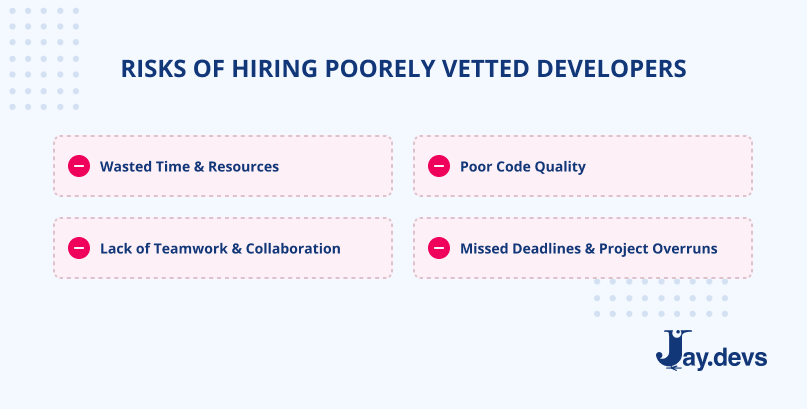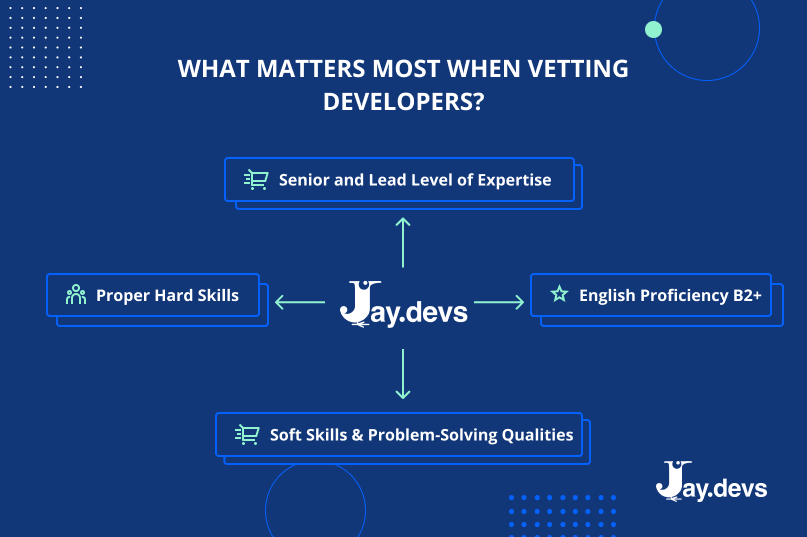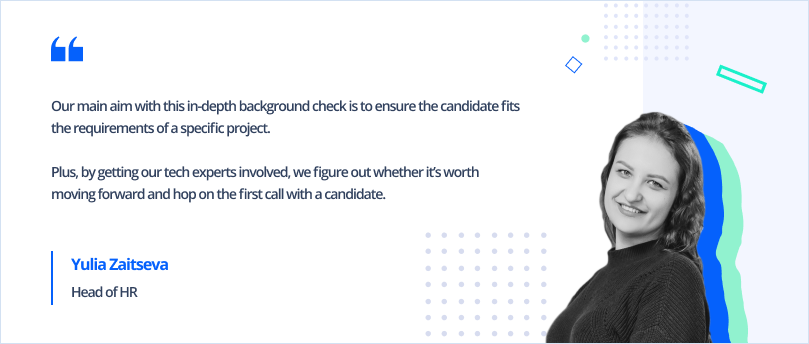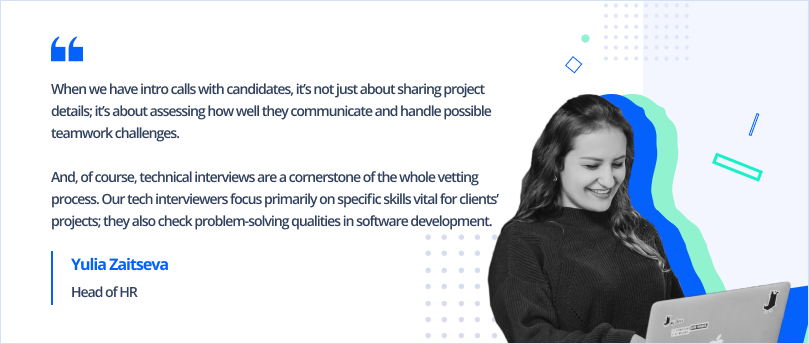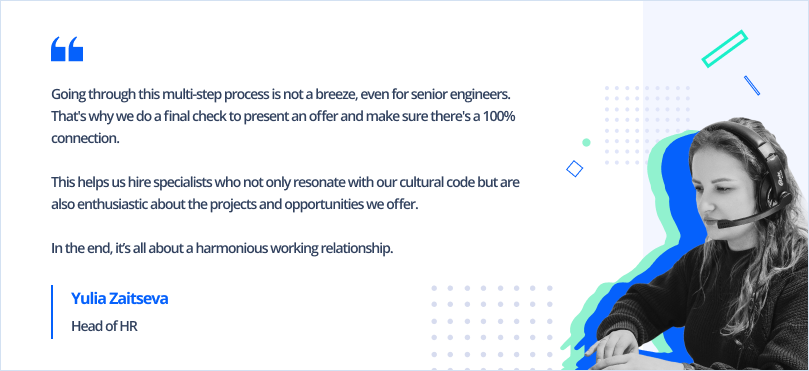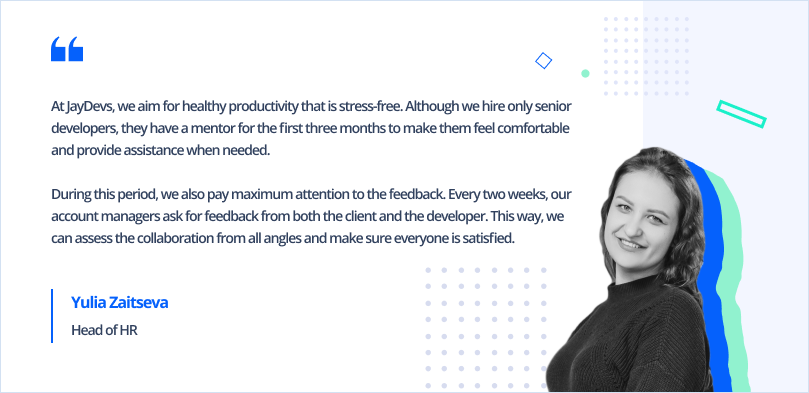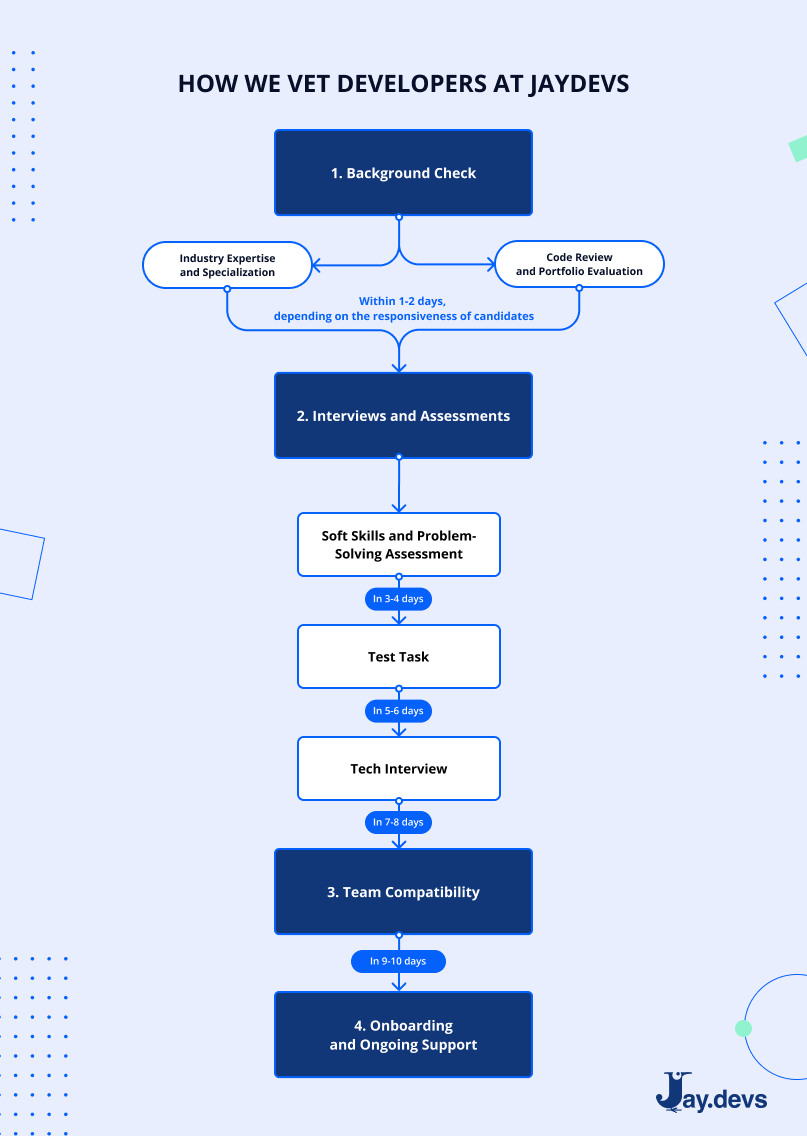In a world driven by digital innovation, the pillar of any successful project is a software development team standing behind it. As businesses increasingly turn to staff augmentation and remote developers, they expect to hire experts with proven experience.
But how can businesses be confident that said chosen developers are professionals only by viewing their CVs?
At JayDevs, we’ve cracked the code to detect software engineers who bring solid expertise, clear communication, and initiative to the development process.
In this article, we’ll take you on a journey through our unique approach to vetting developers – a process that sets the stage for lasting partnerships and exceptional project results.
Why is it Important to Pre-Screen Engineers?
Pre-screening or vetting evaluates and assesses potential software developers before they join your team.
Like any other employee, developers should possess specific skills to seamlessly integrate within your team, collaborate effectively, and deliver code that sings.
So, the vetting process serves as a filter, separating truly qualified engineers from those who might not fit project requirements and the company’s engineering culture.
Risks of Hiring Poorly Vetted Developers
Neglecting the process of vetting developers is similar to playing a game of chance, where the stakes are high, and the odds may be against you. You might strike gold and find a coding prodigy or end up with an unqualified developer. And the risks here are surely tangible.
Wasted Time and Resources
Hiring unvetted developers can lead to a costly misadventure. The resources spent on interviewing, onboarding, and then realizing engineers aren’t up to the task can set your project on hold.
Businesses must start the hiring process from scratch, spending precious time all over again.
Poor Code Quality
Inadequately pre-screened developers can produce code of subpar quality. It can cause many issues, including software bugs, security vulnerabilities, and the need for extensive code refactoring down the road.
As a result, the overall project success can be compromised and stuck in endless debugging.
Lack of Teamwork and Collaboration
Modern software development is all about a collaborative effort involving multiple team members. Even a single developer with poor soft skills can negatively impact the entire team’s productivity and morale.
Thus, hiring developers who are not pre-screened with due attention might disrupt the established development workflows.
Missed Deadlines and Project Overruns
Project deadlines are the finish line in the race of software development. You require skilled, disciplined, and committed team players to adhere to schedules.
When hiring hastily, you may face wasted project hours, budget overruns, and a damaged company reputation.
Vetting Developers: What Matters Most
To eliminate the challenges described above, the process of vetting software developers takes the primary place at JayDevs. We evaluate specific factors that can make or break software projects.
Even though each project is unique, standard screening criteria collectively help bring suitable engineers and IT specialists on board.
Here are the key considerations that we prioritize:
- Proper Hard Skills: We seek engineers with a solid technical foundation and hands-on experience in relevant programming languages, frameworks, and technologies.
- Level of Expertise: We welcome exclusively senior and lead developers with at least five years of professional experience on board.
- English Proficiency: Effective communication is crucial in remote collaborations with our clients, so fluent English is necessary.
- Problem-Solving Abilities: Developers should demonstrate the ability to solve complex issues and find innovative solutions.
In essence, the process of vetting developers at JayDevs relies on a blend of technical and interpersonal skills. By assessing these qualities, we ensure engineers match our in-house values and can deliver thriving software products for our clients.
How we Vet Developers at JayDevs
At JayDevs, vetting developers is not just about ticking boxes. It’s a step-by-step process refined over the years to ensure we bring on board the finest talent in the industry.
Our approach goes beyond surface-level CV screenings and tech interviews. Instead, it delves deep into the fusion of skills that truly matter.
Without further ado, let’s consider each step thoroughly.
1. Background Check
Industry Expertise and Specialization
Different projects naturally demand developers with varying specializations. So, our process begins by analyzing LinkedIn profiles of candidates with the relevant tech stack and professional backgrounds.
Our talent sourcing team evaluates their experience, seniority, project domains, and any additional materials potential candidates provide. If a candidate appears to be a suitable fit, we initiate contact to receive their CV for further screening.
Whether a project calls for web development, mobile app development, or data science, we ensure a seamless match between the skills of an engineer and project needs.
Code Review and Portfolio Evaluation
In the world of software development, a developer’s code speaks volumes. That’s why our talent acquisition specialists closely collaborate with tech leads to access the past projects of potential team members.
Before proceeding to the first interview, we ask candidates to provide links to their GitHub and project portfolios, if available. Our technical pros then carefully examine the code quality, technologies wielded, and the overall complexity of prior projects.
2. Interviews and Assessments
Soft Skills and Problem-Solving Assessment
Soft skills are like the glue that holds a team together. Therefore, on the first call with the selected candidates, we focus on their personality and cooperation qualities.
Our HR managers ask a mix of simple and tricky questions to evaluate interpersonal skills, task prioritization, and illustrative cases from previous projects. They also present real-world scenarios to test the problem-solving abilities, ensuring engineers can tackle issues efficiently.
And, of course, we conduct an English proficiency check. We set the bar at least B2+ level and verify this during the initial screenings.
Read more: Why Soft Skills Matter When Hiring a Software Developer
Test Task
The next essential step of vetting developers is assigning a test task related to the project specifics. Our fundamental goal here is checking the practical knowledge, analytical thinking, and attention to detail in action.
In this context, we do not burden pre-screened developers with overloaded tasks but offer concise and practical assignments. This approach helps to unveil the necessary capabilities quickly.
Technical Interviews
Once pre-screened engineers complete the test task successfully, we invite them to chat with our tech leads. This stage of vetting developers is a wrapping point to confirm their tech proficiency.
During these interviews, we discuss the test task to understand the candidate’s approach and thought process. Additionally, our technicians throw some challenging questions to access the expertise comprehensively — from best engineering practices to solving atypical programming issues.
3. Team Compatibility
After going through all the previous vetting stages, developers are invited to the final call with resource managers. This step helps ensure everyone is on the same page before we “seal the deal.”
Before the call, we send a handy guide covering frequently asked questions. It saves time since engineers can come prepared with a good understanding of our processes, benefits, and other valuable details.
During the call, our resource managers address any remaining concerns the engineers might have. Meanwhile, they also gauge the overall impression of the interviews, test tasks, and interactions with our company.
These simple questions are crucial in helping us evaluate work ethics, adaptability, and synergy with the JayDevs team.
4. Onboarding and Ongoing Support
Unlike hiring agencies or platforms similar to Toptal or Upwork, we cover the entire process of augmenting client teams, from searching to quick developer onboarding onto the projects.
We introduce the newcomers to our “Cultural code” guideline, the existing team, and workflows to ensure flawless onboarding.
If the newly hired engineer goes straight to the project, we provide ongoing solid support during the first three months. This includes regular one-to-one meetings, feedback sessions, and even code reviews.
Read more: Developer Onboarding Checklist: Get to Know the Unknown.
Duration of the Vetting Process
The time for vetting developers can vary based on project complexity and tech requirements. For instance, it’s usually easier to find a senior React.js engineer than someone with expertise in both .Net and Angular.
Sometimes, we receive highly urgent requests from our clients. There were even exceptional cases when we completed the entire process within two days!
However, our focus is on timely delivery while maintaining quality. Thus, the screening process takes about 1-2 weeks on average:
Final Thoughts
Vetting software developers is not just a formality but a critical step toward ensuring the success of projects!
At JayDevs, we take this process seriously, combining technical excellence with soft skills, adaptability, and teamwork. We aim to provide clients with pre-screened developers on demand for short-term and long-term projects.
We have a pool of 100+ senior and lead engineers ready to join your project as individual specialists or a dedicated team.
Contact us for any of your staffing needs and embark on your software development journey with confidence.




